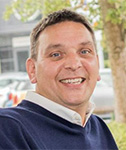
I am a personal injury solicitor at CFG Law in South Manchester and I also happen to be a wheelchair user after a spinal cord injury as a teenager. Aged 14, I dived into the shallow end of my school swimming pool. My head struck the bottom of the pool, breaking my neck at C5/6 and instantly rendering me paralysed and a tetraplegic.
I was treated and rehabilitated for nine long months at the Southport Spinal Injuries Centre.
I am passionate about diversity but given my personal circumstances I care deeply about disability equality and inclusion. I recall the day I had to travel in the guard’s van on the train to London in 1989, as there was no accessible wheelchair space in the train carriage. It was a humiliating experience. We have moved on in terms of how society thinks about disability and supports better wheelchair access with ‘reasonable adjustments’ more commonplace; but we still have a long way to go until those living with an impairment can truly talk about being equal members of society.
I trained at and qualified as a personal injury solicitor in 1999 at Pannone & Partners in Manchester. I have since worked at Fentons, Slater & Gordon & now CFG Law.
I have taken a number of disability discrimination cases to court using the Equality Act 2010 legislation and enforcing the requirement for service providers to make reasonable adjustments to their service provision for disabled people.
On the back of that, I sent a written submission to the House of Lords select committee evaluating the impact of the Equality Act and I was then asked to give oral evidence.
I am a member of the Manchester Law Society equality and diversity committee. I have for a few years now also been a member of the ITV Granada news diversity panel. As a group, we look at stories that are being covered by the news team to ensure that the news team are addressing equality and diversity within their stories.
I attended face-to-face group sessions as part of the legally disabled research addressing disability and diversity in the legal profession. The legally disabled research looked at ways in which the legal profession could adapt to attract more disabled students and support and retain those with a disability working in the profession. The legally disabled research team have presented their research findings remotely at several regional Law Society meetings around the country and I have spoken at a couple of these events, talking about my own experiences as a disabled solicitor.
I am a guest lecturer at the University of Salford where I lecture to occupational therapy students on disability and diversity generally, on how far we have come in terms of achieving equality for people with a disability and steps that we still need to take to achieve social inclusion.
Are we more socially inclusive when it comes to disability – yes of course we are. But I still cannot access the homes of many of my friends and family without help and I still have problems accessing public transport..
I have found the legal profession has looked at diversity across race and gender, but we need to look more at disability. We need to address why disability is so underrepresented in our profession and what we can do to change that. We need disabled solicitors, just like we need female, gay and black solicitors because it is important that the legal profession and our APIL membership is as diverse as those that we seek to serve – the general public.